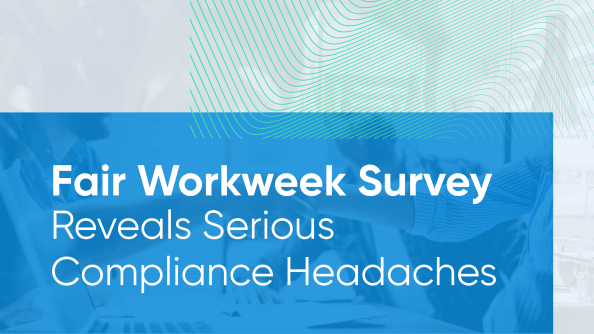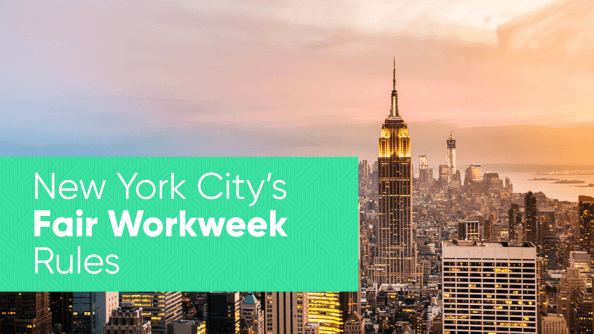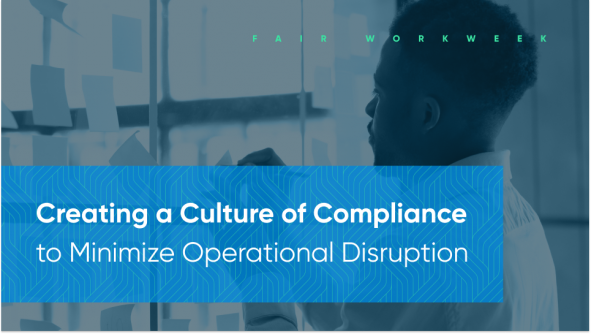NYC Fair Workweek Mastery: Insights from Shake Shake, Five Guys, Chopt, Harri & More

- By Harri Insider Team | October 23, 2024
This article was originally posted on 1851franchise.com.
Harri is hosting a webinar on October 30th, featuring expert insights from brands such as Five Guys, Shake Shack, and Chopt to help other restaurant and franchise operators understand and comply with the NYC Fair Workweek law.
In today’s ever-evolving labor landscape, ensuring compliance with workforce regulations is more critical than ever. The NYC Fair Workweek Law is a prime example of legislation designed to provide stability and predictability in work schedules. However, many businesses are still navigating the intricacies of these laws, leading to significant financial penalties when they fall short.
Restaurant operators, and with good reason, are focused on profitability and tasked with delivering more revenue and optimizing labor costs to boost margins. Compliance plays a big role in that optimization and can impact a restaurant’s bottom line in a myriad of ways. This is why restaurant operators need to pay particular attention to how they manage their labor to ensure they’re optimizing costs, staying compliant and keeping their employees happy. Easier said than done.
That’s why on October 30th, Harri will host a webinar that explores the essential requirements of the NYC Fair Workweek Law, providing businesses with valuable insights from a panel of industry experts. It’s a crucial opportunity for owners and operators to deepen their understanding of these regulations and protect their operations from costly mistakes. There will also be a live Q&A with the panel of experts, including one of New York City’s top labor lawyers.
What Is the NYC Fair Workweek Law?
Enacted in 2017, the NYC Fair Workweek Law aims to provide hourly employees with the same level of stability as salaried workers.
“It ensures that, in the event an employee is subject to last-minute schedule changes initiated by the employer, they are compensated for those changes,” said Samantha Gallagher, Director of product compliance for Harri. “It also ensures that they have adequate rest periods. They get to go home for at least 11 hours between their shifts; they have the opportunity to go to bed, maybe get a meal before they’re expected to come back to work.”
The law mandates that fast food establishments must provide predictable work schedules for their employees. Some of the core objectives of this law include:
- Advance Notice of Schedules. Employers must provide covered employees with their work schedules at least 14 days in advance.
- Compensation for Schedule Changes. If a schedule is altered within that 14-day window, covered employers must compensate employees for the change.
- Guaranteed Rest Periods. Covered employees are entitled to at least 11 hours of rest between shifts.
- Employee Consent for Changes. If a scheduling manager adds hours to an existing schedule within the advance notice period, the affected employee must provide their consent for the change to be made effective. These provisions are designed to protect employees from being called in for last-minute shifts or being overworked without adequate rest. They also ensure that workers know their schedules well in advance, allowing them to plan their personal lives more effectively.
Why NYC Fair Workweek Compliance Matters
Non-compliance with these laws can have serious financial implications for businesses. A prime example is Chipotle, which settled a claim in 2022 under the NYC Fair Workweek law for $20 million. The settlement stemmed from alleged violations, including failure to provide advance notice of schedule changes and adequate rest between shifts. This case is a stark reminder that failing to adhere to these regulations can quickly become expensive.
The complexity of the NYC Fair Workweek law extends beyond just fast food. Many businesses with multiple locations face the challenge of complying with different regulations across state lines, particularly as these laws vary by municipality.
“Fair Workweek settings need to be configured at the unit level,” said Gallagher, “ensuring that businesses with locations in different jurisdictions can manage compliance more effectively.”
Avoiding Compliance Pitfalls
So, how can businesses stay on top of these regulations? The key is using technology that integrates compliance into daily workflows. Gallagher emphasizes that workforce management systems like Harri’s can help ensure compliance by automating many processes, such as automatically tracking and managing schedule changes, to ensure employers don’t accidentally violate the law by scheduling employees outside their allowed hours.
Without these tools, businesses are left to manage compliance manually — a risky approach. “Audits sneak up on everybody,” said Gallagher, “and it only takes one error to potentially lead to costly fines and severe penalties.” A comprehensive workforce management system can mitigate these risks, making it easier for restaurant operators – and their managers – to manage employee schedules, track consent for changes, and stay compliant with the law.
Compliance Doesn’t Have to be Scary
To help businesses navigate these complex regulations, Harri is hosting a webinar on October 30th, the day before Halloween. Gallagher will be joined by Bethany Longer, chief people officer of Five Guys New York, Matt Foerster, manager of predictive scheduling compliance of Shake Shack, Beatriz Lopez, human resources generalist Founder’s Tabe, and Glenn Grindlinger, one of NYC’s top labor lawyers from Fox Rothschild LLP, to offer expert advice and insights on the NYC Fair Workweek law and provide actionable strategies for ensuring compliance in your business. Registration is still open, save your seat now!





















